As climate change intensifies and urbanisation accelerates, cities around the world are increasingly defined by water. In some cases they have too little, sometimes too much, or sometimes water that’s too dirty.
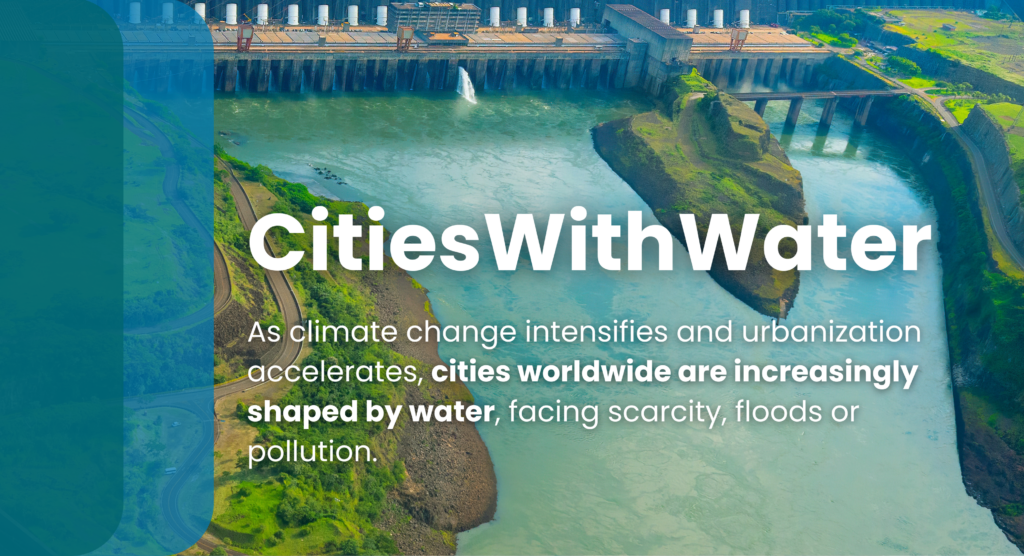
The CitiesWithWater initiative has placed water firmly on the urban sustainability agenda. Through a webinar series and an international photography competition, CitiesWithWater is raising the voice of cities and learning how they can and should act now to safeguard water systems, human well-being and ecosystems.

In the recent webinar titled “Too Much“, hosted in collaboration with the World Water Council, city leaders and technical experts explored how urban areas are preparing for or recovering from floods, storms, sea-level rise and the cascading impacts of climate change. This second installment in the CitiesWithWater series followed the success of the first (“Too Little”) and sets the stage for the upcoming webinar, “Too Dirty”, which will delve into water pollution and the urgent need to protect downstream ecosystems and coastal waters.
The “Too Much” webinar (18 June 2025) highlighted that flood-related disasters have increased by 134% since 2000 (WMO, 2021), a statistic that no city can afford to ignore. Panellists from cities including Kumamoto (Japan), Lusaka (Zambia), Ningbo (China), and Larissa (Greece) shared powerful case studies on how their municipalities are adapting to flood risks.
What happens upstream doesn’t stay upstream. With the UN Ocean Conference (UNOC) recently reaffirming the vital links between terrestrial and marine systems, CitiesWithWater is also working to bridge the gap between urban water governance and coastal health. Dirty or excessive water from cities — be it stormwater, untreated sewage, or plastic waste — flows downstream, posing major threats to fragile estuaries, coral reefs and fisheries.
In the upcoming “Too Dirty” webinar, these linkages will be explored more deeply. How can cities protect downstream ecosystems from pollution while safeguarding human health and livelihoods? What does it take to reduce nutrient runoff, manage industrial discharge and treat wastewater effectively in dense urban settings?
With the Convention on Wetlands COP15 fast approaching in July 2025 in Victoria Falls, Zimbabwe, CitiesWithWater is also drawing attention to the vital role of urban wetlands. These ecosystems, often overlooked in city planning, act as natural sponges that absorb floodwaters, filter pollutants and recharge aquifers.
Wetlands also serve as critical habitat for biodiversity, cooling spaces for urban residents and buffers against sea-level rise and coastal storms. Yet urban expansion continues to degrade or destroy them. Between 1970 and 2015, 35% of the world’s wetlands were lost (Ramsar Global Wetland Outlook, 2018), and many that remain are under pressure from pollution, encroachment and climate change.
Cities that invest in wetland protection and restoration — like Cape Town’s rehabilitation of the Zandvlei Estuary or Kolkata’s use of its East Kolkata Wetlands for natural sewage treatment — are leading the way in reintegrating nature into urban water systems.
Urban water systems are not just pipes and pumps. They are the veins and arteries of a living city to sustain health, enable growth and connect communities. Yet they are under serious threat:
Cities around the world experience water as being either too little, too much, or too dirty, and often usually a combination of the three. Rapid urbanisation, climate change, biodiversity loss and landscape degradation mean that many cities are facing chronic water insecurity. In 2023 alone, two-thirds of the global population experienced water stress, while cities from Cape Town to São Paulo have faced severe droughts over the past decade. Meanwhile, excessive rainfall and poor infrastructure left cities like Nairobi and Jakarta struggling with catastrophic flooding.
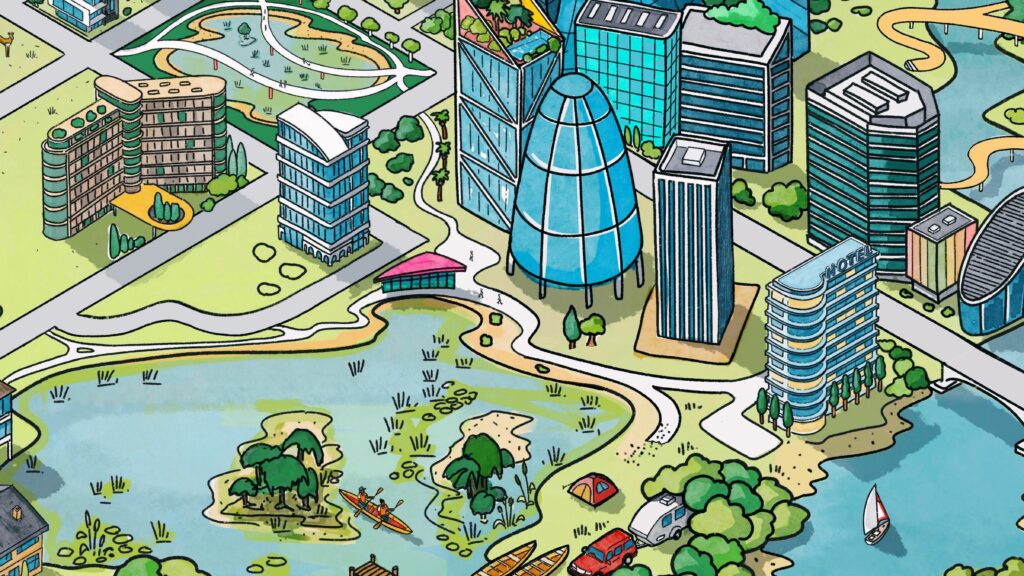
The economic cost of flooding is staggering. According to the multinational professional services firm Aon, urban flooding globally caused USD 105 billion in damages in 2021, disrupting economies, displacing millions, and overwhelming emergency response systems. In 2021, record-breaking floods in Germany and Belgium caused over €46 billion in damages, highlighting the vulnerability of even well-developed urban areas.
Water pollution further exacerbates urban water challenges. 80% of the world’s wastewater is discharged untreated into rivers, lakes, and oceans, contaminating drinking water and harming ecosystems. The UN estimates that polluted water leads to 1.8 million deaths annually, primarily due to waterborne diseases. Additionally, industrial waste and plastic pollution in urban waterways disrupt aquatic life and reduce the availability of clean water for consumption and irrigation.
A direct result of climate change is that the hydrological cycle has changed with flows between physical states (liquid, gas, ice and back) speeded up, resulting in more infrequent, shorter, and more intense precipitation in many parts of the world. Floods and droughts follow each other in close succession, while higher temperatures provide a fertile breeding ground for algal blooms and water-borne diseases.
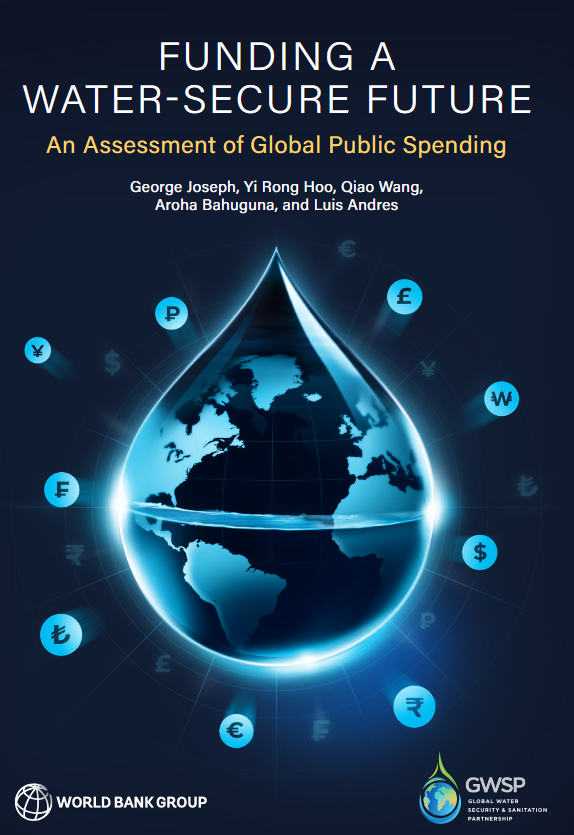
The water sector globally is underinvested with the recently released World Bank report “Funding a Water-Secure Future: An Assessment of Public Spending” finding that in 2023 just 1.2% of public funding was invested in water infrastructure globally. More concerningly, the report finds that the annual funding shortfall to achieve SDG 6.1 (achieve universal and equitable access to safe and affordable drinking water for all) and SDG 6.2 (achieve access to adequate and equitable sanitation and hygiene for all) is USD 140.8 billion.
The question is no longer if cities will be affected by water crises, but rather, how can cities adapt for a more water-resilient future?
Nature-based Solutions (NbS) offer a powerful, cost-effective way for cities to tackle water challenges. Instead of relying solely on expensive grey infrastructure, cities can leverage natural systems to manage water sustainably. NbS investments are also a way of protecting investments in grey infrastructure by reducing the risk of flood damage, siltation, and salinisation. Green roofs, wetlands, urban forests, and permeable surfaces not only reduce flooding and improve water quality but also enhance biodiversity and create healthier urban spaces. For these investments in NbS to be sustainable it is important that they are included in the municipal asset register, listed as an item of grey infrastructure, such as a dam or a wastewater treatment works. Only then will they attract an annual operation and maintenance budget to keep them in the condition whereby they can continue providing service.
However, there is much work to be done at all levels. Investments in urban NbS projects are on the decline and only 37% of the world’s 500 most populous cities have specific strategies in place to sustainably manage and protect nature. A comprehensive study by the World Economic Forum (WEF) Nature Positive: Financing the Transition in Cities released in 2024 shows that from 2018 to 2023 there was a 47% drop in water-related urban nature finance approvals by the major multilateral development banks. Further, the report finds that only 0.3% of global urban infrastructure spending is allocated to NbS and on average less than 10% of total approved project expenditure from MDBs between 2018 and 2023 was directed towards urban nature projects.
For cities looking to take action, the message is clear: Nature is not an obstacle to urban development, it’s the foundation for a sustainable future.
CitiesWithWater webinar series
The CitiesWithWater webinar series, an initiative under the CitiesWithNature platform, will showcase leading examples of how urban areas are integrating NbS into water management strategies and financing their implementation. Examples include Barcelona highlighting its innovative use of urban wetlands and stormwater harvesting to reduce dependence on external water sources. Similarly, Bogotá has restored its high-altitude wetlands, ensuring long-term water security for its residents while preserving critical ecosystems, while Cape Town is developing a large-scale managed aquifer recharge system using a blended finance model developed with support of the World Bank.
A key takeaway from these discussions is that collaboration between city planners, environmentalists, the private sector, and communities is essential.
Inspiring action through visual storytelling
Recognising the power of visual storytelling, the CitiesWithNature International Photography Competition is inviting photographers to capture how nature is shaping urban water resilience. From rain gardens in Melbourne to mangrove restorations in Manila, powerful images are helping to highlight solutions to water being too little, too much or too dirty. The competition not only raises awareness but also inspires decision-makers to invest in sustainable, nature-based water solutions.
The challenges of urban water management are daunting, but cities do not have to tackle them alone. Through global platforms like CitiesWithNature and initiatives like the CitiesWithWater webinar series, cities can learn from one another and implement tested, scalable solutions. Investing in NBS is not just about securing water for today, it’s about ensuring resilience for generations to come.
Click below to learn more about the upcoming photography competition and webinar series.
While wetland ecosystems are increasingly being recognized as highly valuable natural assets that provide a wide range of benefits to urban communities, the services they provide are under immense pressure due to rapid urban expansion and human activity. Cities are uniquely positioned to drive local action to protect our wetlands.
Below are five key action areas for cities to mobilize urban communities for wetlands:
Integrate wetland management goals into municipal development plans, zoning regulations, and climate resilience strategies.
Advocate for wetlands as critical infrastructure in disaster risk management, emphasizing their role in flood mitigation, erosion control, and urban cooling.
Allocate funding for wetland restoration and maintenance as part of city budgets.
Highlight wetlands’ function as natural water filters, improving water quality for drinking and sanitation.
Educate communities about the importance of wetlands in regulating stream flow, preventing floods, and mitigating droughts.
Encourage partnerships between cities and water utilities to protect wetlands as vital water supply sources.

In the weeks to come, and during our meeting in Rome this February, I will work alongside Parties to build the trust and consensus needed to achieve Peace with Nature, ensuring that the goals and targets of the Kunming-Montreal Global Biodiversity Framework (KMGBF) translate into tangible action. Securing adequate and predictable financing will be central to our efforts, enabling transformative change for biodiversity while ensuring benefits for communities and ecosystems alike.
– said H.E. Susana Muhamad, Minister of Environment and Sustainable Development of Colombia and President of COP16.
Organize events such as guided wetland tours, birdwatching activities, and clean-up drives to connect urban communities with local wetlands.
Collaborate with schools and universities to use wetlands as outdoor classrooms for environmental education.
Celebrate World Wetlands Day by showcasing wetlands’ cultural, recreational, and ecological value through art exhibitions, storytelling sessions, and public campaigns.
Showcase wetlands’ role in carbon storage and their contributions to achieving climate targets at city and regional levels.
Promote the restoration of urban wetlands as natural climate buffers that reduce the impacts of extreme weather events.
Highlight their role in preserving biodiversity by creating habitat corridors that link urban green spaces and facilitate species migration.
Encourage eco-tourism and recreational activities like boating, fishing, and wetland safaris to generate local employment.
Support community-based initiatives in wetland restoration, creating jobs and fostering skills in conservation and sustainable resource use.
Showcase the agricultural and economic benefits of wetlands, such as fisheries, fertile soils, and natural resources, as integral to urban food security and poverty reduction.

Opinion piece by Gareth Presch, CEO, World Health Innovation Summit
Climate change is the single biggest health threat facing humanity. The impacts are already harming health through air pollution, disease, extreme weather events, forced displacement, food insecurity and pressures on mental health. Every year, environmental factors take the lives of around 13 million people. Over 90% of people breathe unhealthy levels of air pollution, largely resulting from burning fossil fuels driving climate change. This is a major problem, especially in urban areas. In 2018, air pollution from fossil fuels caused $2.9 trillion in health and economic costs, about $8 billion a day.
The potential of urban green and blue spaces to generate better health and well-being is clear. Countries around the world are adopting Green Social Prescribing. Green social prescribing is the practice of supporting people to engage in nature-based interventions and activities to improve their mental and physical health. Green social prescribing includes both what is known as green and blue activities. These could include local walking schemes, community gardening projects, conservation volunteering, green gyms, open water swimming or arts and cultural activities which take place outdoors. These activities may be ‘prescribed’ by link workers (and other trusted professionals) alongside other forms of support, for example, referrals to support housing or finances – based on the needs and circumstances of each individual (Global Social Prescribing Alliance).
There are numerous known benefits associated with increased exposure to urban nature. This includes health and well-being benefits, such as:

e.g. directly, through reduced air pollution and cooling effects, or indirectly, through increased opportunities for physical activity

e.g. stress relief or reducing harms such as noise

e.g. support of urban nature for social contact and cohesion

Finland is leading the way with clean cities and towns based on the recent 2023 World Air Quality Report by IQAir. Indeed, the towns of Sodankylä, Utsjoki and Kuusamo in Finland came out as being the least polluted in the world compared with more than 7,800 different places world wide. The concentrations of small particles in the air were measured in 134 different countries and regions in 2023. According to the report, only seven countries fell below the air quality recommendations set by the World Health Organization (WHO) for the concentration of fine particles. According to the organization, the annual average value of small particles in the air should be less than 5 micrograms per cubic meter. In addition to Finland, Estonia, Iceland, Australia, New Zealand, Mauritius and Grenada fell below the limit. In a comparison of over a hundred capital cities, Helsinki ranked in the top ten in terms of air quality, but even fewer fine particles were measured in the air of the capital cities of Estonia, Iceland, Australia and New Zealand, for example. The most polluted air was in Bangladesh, Pakistan and India. The most polluted capital cities were Delhi in India and Dhaka in Bangladesh.
Ninety-nine percent of the world’s population breathes air that does not meet the limit values set by the WHO and can be harmful to health and air pollution causes seven million premature deaths every year.
With 55% of the world’s population living in urban areas and an additional 52.5 billion urban residents expected in the next 30 years, and with 65% of SDG targets being relevant to cities, it’s no surprise the battle for sustainable development will be won or lost in cities
A healthy, thriving natural environment is vital for creating resilient urban places. Cities were on the frontline of the COVID-19 pandemic. The UN’s Report on COVID-19 in an Urban World (2020) noted that 90% of reported cases at that time were in urban areas. While urban density was found not in itself to be a decisive factor in the transmission of the virus, inequality, inadequate housing, strained health systems, inadequate water and sanitation services and pollution made certain urban areas vulnerable. The pandemic calls for a renewed emphasis on a just and green urban transition, and a renewed focus on addressing inequalities in cities and by promoting nature in cities we can see benefits for citizens.
Image reference: Lancet Planetary
The climate crisis urgently calls to accelerate the shift towards renewable sources of energy. The way cities are planned and managed has a profound impact on energy demand which impacts our health and nature. Compact, well-planned and managed cities, with non-motorised mobility options, green public spaces and natural cooling/temperature regulation measures tend to have below national levels of energy consumption. These transitions will support our health and well-being.

As health becomes far more important in determining investment we understand that when health is compromised so is our economic growth. At the Annual Investment Global Conference 2023 (ref: AIM Report) in Abu Dhabi last year I ran a workshop for the World Association of Investment and Promotional Agencies highlighting the opportunities to invest wisely in health and wellbeing which would deliver long-term economic returns. This was followed up by the COP28 declaration “Healthy Planet, Healthy People” which calls on the health/public sector to support the SDGs with a 1% commitment from the sector’s pension funds (WHS – not for profit fund). We’re now seeing these new models of healthcare that are focused on the environment and nature ultimately preventing disease while supporting economic growth (New WHIS ESG – Health, Climate Place Based Impact Model). As a result, new opportunities are emerging through partnership working – the establishment of Ecogreen Green Capital (African Focused – Great Green Wall of Africa Foundation) at COP28 and a new fund with the Commonwealth Pacific Climate Fund that will support the Commonwealth’s Small Island Development States for example.
We must plan and manage our cities in a way that simultaneously accelerates the achievement of SDGs and responds to global megatrends.

Image: COP28 Declaration & Ecogreen Capital Launched

Have you ever heard of a “Blue Flag beach”? Of course you have! The iconic Blue Flag is one of the world’s most recognized voluntary awards for beaches, marinas, and sustainable boating tourism operators.
We are proud to announce that Blue Flag has joined the global CitiesWithNature partnership initiative!
Image provided by: Blue Flag
Coastal zones are critical areas, not only to provide livelihoods and recreational opportunities, but because they serve as immensely important buffer areas to sea level rise, deadly floods and storm surges, while also providing essential, safe havens and breeding grounds for many fish species and countless other organisms, plants and animals. Blue Flag, founded by the Foundation for Environmental Education (FEE), will actively work with CitiesWithNature to promote nature conservation activities across its networks.
“We know that we can achieve more together than separately and will strive to make the most of our collaboration as we implement solutions for people and the planet.”
Daniel Schaffer, CEO of the Foundation for Environmental Education
To qualify for the Blue Flag, a series of stringent environmental, educational, safety, and accessibility criteria must be met and maintained. The beach must comply with laws and/or regulations pertaining to issues related to coastal zone planning, environmental management, wastewater management, environmental conservation, and others in order to receive and maintain Blue Flag status.
With this awards system, the mission of Blue Flag is to promote sustainability in the tourism sector, through environmental education, environmental protection and other sustainable development practices. As a result of Blue Flag and its partnerships, more than 5,000 beaches, marinas and eco-tourism boats are concretely contributing to the sustainable development goals. Blue Flag also campaigns against disparity, inequality, unemployment, health threats, depletion of natural resources, environmental threats, pollution and general environmental degradation. Find out more about Blue Flag’s efforts to contribute to the Sustainable Development Goals here.
In addition to its role in maintaining coastal ecosystems, FEE is also a recognized world leader within the fields of Environmental Education and Education for Sustainable Development. Through its three youth-focused educational programs, Eco-Schools, Learning about Forests (LEAF), and Young Reporters for the Environment (YRE), the organization uses a solutions-based pedagogical approach to empower young people to create a more environmentally conscious world.
As an international umbrella organization, FEE has over 100 members in 81 countries and has its Global Secretariat in Copenhagen, Denmark. Through this partnership, CitiesWithNature and Blue Flag will work towards bringing even more unique and tailor-made technical services, reporting mechanisms, capacity-building and funding opportunities – specifically in the field of coastal management – to our collective Blue Flag and CitiesWitNature cities and towns globally.
“We are so pleased to welcome the highly respected global Blue Flag programme into the CitiesWithNature initiative, demonstrating our shared commitment to work with subnational and local governments in coastal cities to ensure that we live, act and plan with nature. This partnership provides a unique opportunity for urban communities and their governments to rise to the challenge and take ownership of our precious shores, committing to renewed action as part of this important Decade on Ecosystem Restoration.”
Kobie Brand, Deputy Director General of ICLEI
This new partnership comes right on time, with world leaders recognising and adopting an action-oriented Political Declaration to save the ocean from existing and future threats, including marine pollution, harmful fishing practices, biodiversity loss, and acidification at the 2022 UN Oceans Conference in Lisbon – co-hosted by Kenya and Portugal in June this year at the onset of the United Nations Decade of Oceans Science for Sustainable Development (2021-2030).
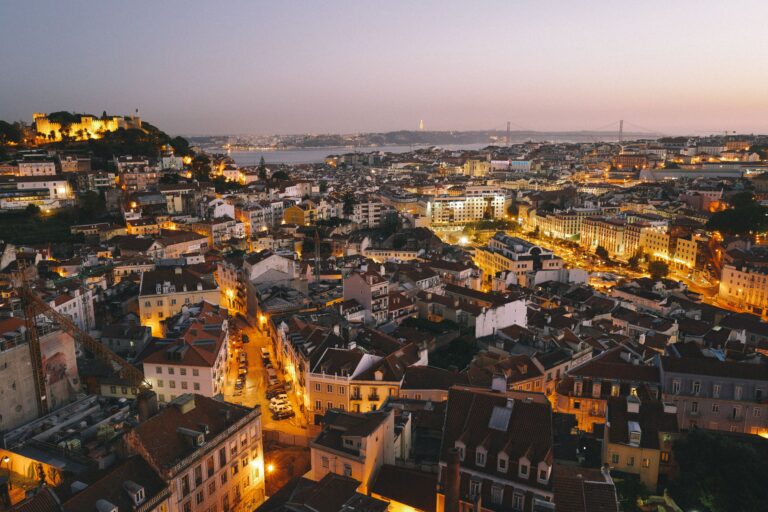
The UN Ocean Conference, co-hosted by the Governments of Kenya and Portugal, took place between 27 June and 1 July 2022 in Lisbon, Portugal, and culminated in delegates adopting a political declaration titled ‘Our Ocean, Our Future, Our Responsibility’.
The conference brought together national and local governments, UN agencies, and multiple stakeholders across different sectors to explore and identify solutions aimed at finding major structural transformations and common shared solutions, to be anchored in the SDGs.
Under the theme ‘Scaling up ocean action based on science and innovation for the implementation of Goal 14: stocktaking, partnerships and solutions’, discussions focused on leveraging interlinkages between Sustainable Development Goal 14 (SDG 14 – Conserve and sustainably use the oceans, seas and marine resources for sustainable development) and other SDGs towards the implementation of the 2030 Agenda for Sustainable Development. Throughout the conference, the linkages between SDG 14 and goals related to clean water and sanitation, poverty, food security, health, women, decent work, climate action, cities, terrestrial ecosystems, and partnerships were emphasized.
Jessie Turner, Director of the International Alliance to Combat Ocean Acidification (OA Alliance) captured the importance of urgent action for oceans: “When talking about climate change impacts on our ocean, we must be clear that while we don’t know everything, we know enough to act. We know enough to begin prioritizing and exploring the key questions that are most important to policy makers, seafood industries and coastal communities. And the good news is…we have lots of existing frameworks across different scales of governance that can be leveraged to take up this work.”
ICLEI – Local Governments for Sustainability and ICLEI’s Cities Biodiversity Center was represented by Kate Strachan – Manager, Climate Change Resilience, ICLEI Africa, and Stefania Romano – Global Coordinator for CitiesWithNature and RegionsWithNature, Recruitment and Advocacy.
During an interactive dialogue titled ‘Leveraging interlinkages between Sustainable Development Goal 14 and other Goals towards the implementation of the 2030 Agenda’, ICLEI emphasized the need for cities to learn from one another and apply these lessons and practices to protect, manage and restore vulnerable urban coastal ecosystems. To achieve this, CitiesWithNature and RegionsWithNature are international partnership initiatives providing a platform to connect local and subnational governments globally with NGOs, experts and communities to act for nature.
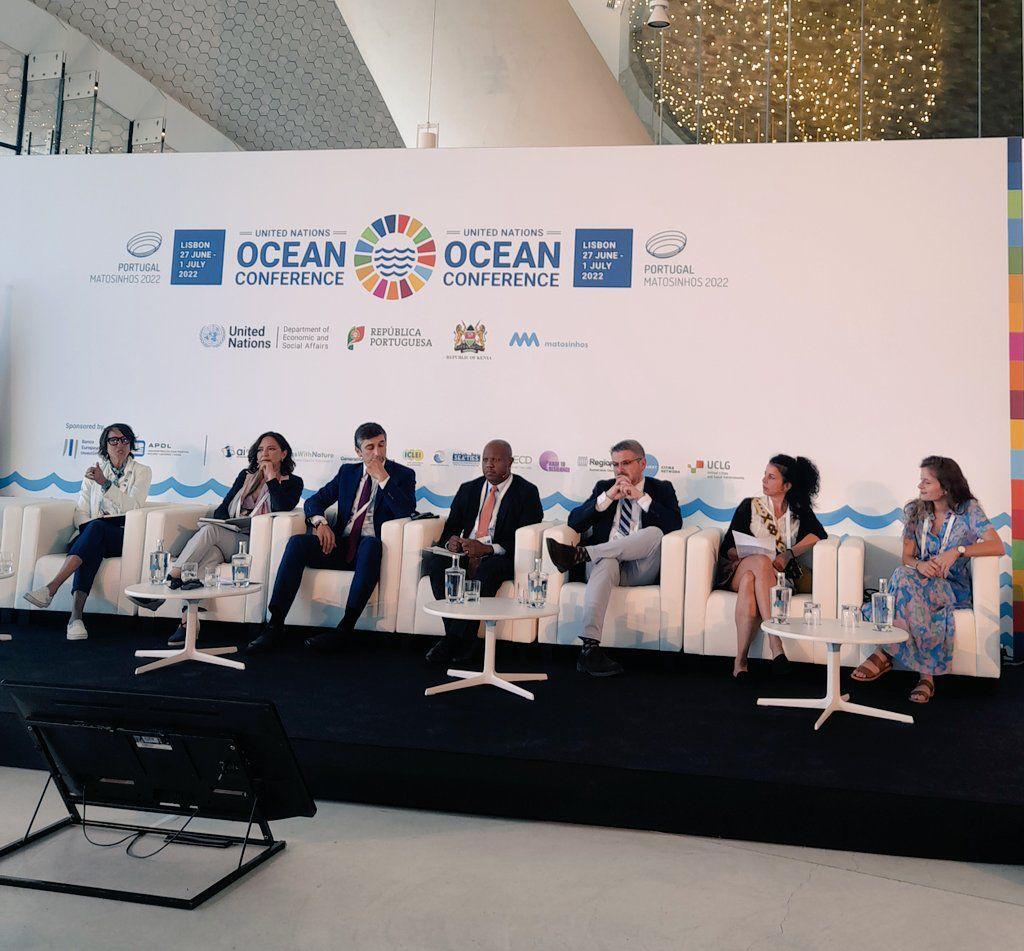
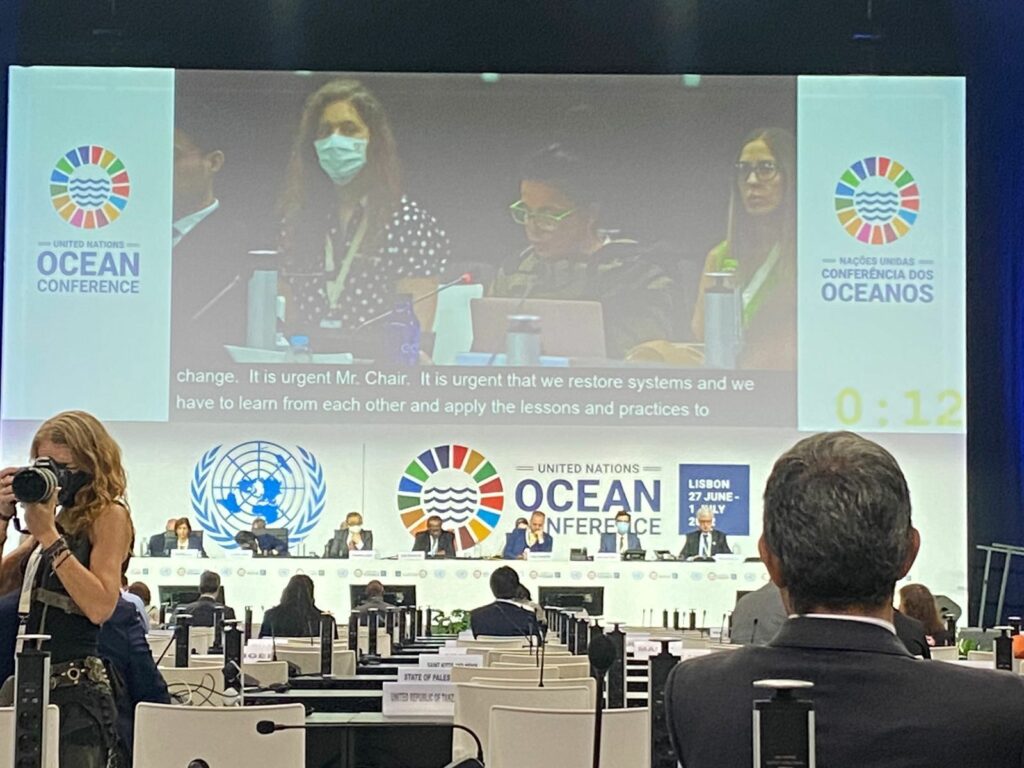
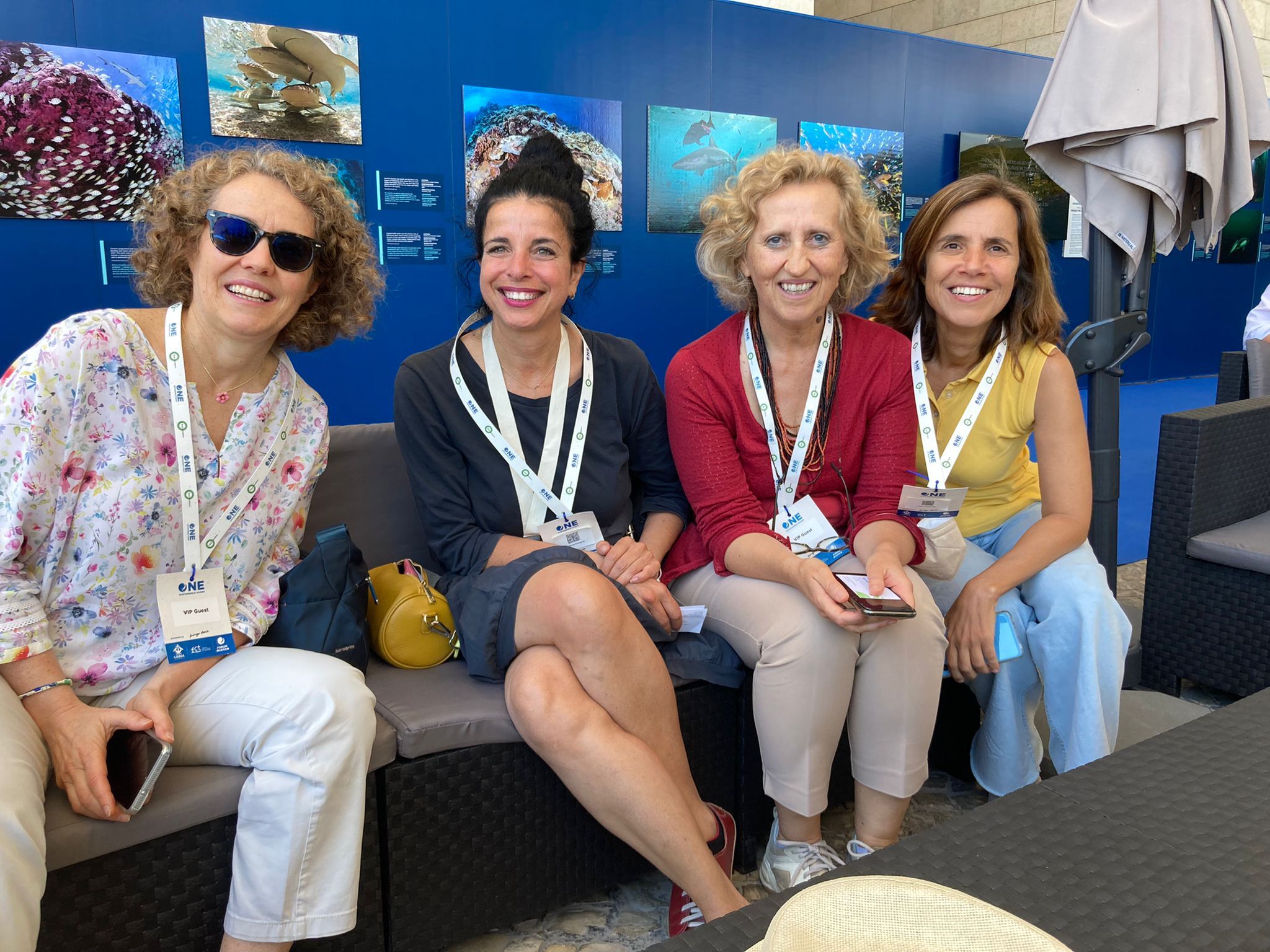
By 2025, nearly 6 billion people will live within 200 km of a coastline. Population growth and climate change-related impacts are increasing coastal risks and degrading coastal ecosystems upon which millions depend. Climate change impacts also compound existing pressures, such as pollution from land-based sources, ocean acidification and overfishing. Coastal cities and regions have unique opportunities to mobilize and demonstrate leadership in taking action to protect our ocean and ensure that the ocean and its accompanying coast are sustainably managed.
“It has never been as urgent as it is today to restore damaged ecosystems,” Stefania said. “SDG 14 offers a great opportunity to advance ocean sustainability globally and address current and emerging threats.” The goal is underpinned by targets addressing the conservation and sustainable use of the ocean, seas and marine resources – including coastal zones – and capacity building for ocean governance. In addition, SDG 14 supports the achievement of SDGs related to poverty alleviation, food security, sustainable blue/ocean economy, and climate change.
ICLEI was involved in a number of sessions and played a role in bringing to the forefront the role of subnational governments in ocean governance. As evident during the conference, both national and subnational governments are leading the way, taking domestic and international actions that expand climate-ocean policy and financing for this work.
Organizations and partnership initiatives such as ICLEI, CitiesWithNature and RegionsWithNature can facilitate learning from coastal city leaders, while simultaneously seeking deeper integration across climate, ocean and biodiversity commitments. These efforts will advance actions that address climate change, support food security and sovereignty, and increase resilience of marine ecosystems, economies, and communities.
Despite the delays in pivotal ocean and climate convenings and benchmarks as a result of Covid-19 restrictions, the UN Oceans conference sparked momentum once again, through the notable outcome of the 2022 UN Oceans Conference – the ‘Our Ocean, Our Future, Our Responsibility’ declaration.
Prior to the official Conference, a Special Event on ‘Localizing Ocean Action’ was held in Matosinhos (Porto) on 25 of July, convened by the co-hosts of the 2022 UN Ocean Conference, together with the City of Matosinhos, and organized in collaboration with UN DESA, UN Global Compact, the Climate Champions Team, the Global Taskforce of Local and Regional Governments, ICLEI, Regions4 Sustainable Development, Ocean & Climate Platform (OCP), United Cities and Local Governments (UCLG), Resilient Cities Network, the International Association of Cities & Ports (AIVP) and OECD. The special session highlighted urban-ocean linkages, specifically around marine plastic pollution, blue finance, local community development, human rights-based approaches towards transformation, and SDG 14 and the Post-2020 Global Biodiversity Framework. The special event also covered the role of local and regional governments to engage in global efforts and decisions to protect the ocean and maritime resources. The outcomes from the special event were conveyed during the main UN Ocean Conference.
ICLEI and the OCP co-organized Local Ocean Action Session 1, titled ‘The clock is ticking: How can coastal cities build resilience and incorporate nature-based solutions to protect local populations?’ This session focused on the importance of investing in innovative sustainable solutions, particularly nature-based ones, to combat the impacts of climate change, such as flooding, coastal erosion and rising sea levels. Speakers were invited to share innovative practices implemented by cities and regions. The panel was moderated by Kate Strachan, while Stefania Romano presented CitiesWithNature and RegionsWithNature as the Convention on Biological Diversity-recognized international partnership initiatives providing a platform and connecting local and subnational governments acting for nature. The side-event resulted in the Municipality of Matosinhos joining CitiesWithNature.
ICLEI in collaboration with Regions4, the Government of Catalonia, UCLG, and the Global Taskforce of Local and Regional Governments co-organized session 3: ‘Strengthening Cooperation, Building Innovative Governance Approaches to protect the ocean. Finding solutions to the complex and multi-dimensional sustainability challenges faced by coastal areas, which are aggravated by climate change, requires an inclusive and innovative governance approach. Building on the previous sessions that focused on impacts and finance, this session focused on governance as a core condition for the implementation of SDG14.
Register now for Connective Cities’ session on planning for sustainable infrastructure titled ‘Green infrastructure: Guidance & recommendations for overcoming the implementation gap in cities’. The event will take place online on 8 June 2022 14:00 – 16:00 (CEST).
The European Commission defines Green Infrastructure as “a strategically planned network of natural and semi-natural areas with other environmental features designed and managed to deliver a wide range of ecosystem services such as water purification, air quality, space for recreation and climate mitigation and adaptation.”
There are already many innovative strategies and practices on local level in place when it comes to sustainable urban planning, urban greening, and land-use as well as ecosystem-based management practices. However, there is also a lack of systematic implementation of urban green infrastructure and underpinning cross-sectoral governance and management arrangements as well as access to these practice-oriented solutions and the relevant contacts.
To this end, Connective Cities and in partnership with NetworkNature is organising this session that focuses on the main barriers of green infrastructure implementation. The session also aims at highlighting best practices and experience of European and international cities in overcoming these barriers as well as introducing the audience to available guidance and resources. The session showcases the findings of the scientific opinion paper drafted for the German Environment Agency, and a mapping of remaining nature-based solutions knowledge and implementation gaps performed as part of the H2020 project NetworkNature. The session also aims at highlighting best practices and experience of European and international cities in overcoming these barriers as well as introducing the audience to available guidance and resources.

Here on the CitiesWithNature platform, over 200 cities from around the world are connecting, sharing their experiences and actions, and benefiting from access to a range of partner organisations and practical tools.
CitiesWithNature enables local governments and their partners to:
– Showcase their city’s actions and plans, understand how they contribute to global nature goals and easily track their achievements on the Action Platform
– Integrate nature throughout their city’s plans, policies and operations via the Nature Pathway
– Access cutting-edge tools and resources on nature-based solutions, ecosystem restoration and biodiversity conservation on the Tools & Resources Hub
– Get practical guidance on key topics such as resilience and catchment management via the Guides
– Connect with other cities and leading international partner organisations
– Share their city’s nature work with a global audience
Not yet part of CitiesWithNature? It’s easy and free to join. Watch this tutorial to see how to register your city and activate your account on CitiesWithNature:
Your City Profile is where you can showcase your city’s nature work and where all your activities on the platform are gathered. The basic information that cities can upload on their City Profiles is a photo of the mayor, a short overview of the city, its natural features and biodiversity work, relevant social media channels, and some photos of natural areas and biodiversity initiatives that the city is proud of.
In addition to this standard information, cities use the Nature Pathway to share key documents such as their Environmental Strategy, Local Biodiversity Strategy and Action Plan, etc., to showcase their work and inspire other cities.
On the Tools and Resources Hub, cities can also share specific tools or resources such as guidelines, handbooks or case studies.
Lastly, cities can also post news updates, photos, videos or weblinks on their City Profiles.
Check out the inspiring profiles of these cities: Barcelona, Cape Town, Montreal, San Antonio TX, Baia Mare and West Torrens in Adelaide.
The Tools & Resources Hub on the CitiesWithNature platform provides easy access to a wide range of reliable resources and cutting-edge tools on nature-based solutions. All in one place, and for free. See what tools and resources we have on nature-based solutions.
What is the Nature Pathway?
The Nature Pathway is a comprehensive roadmap that helps you to integrate nature throughout your city’s plans, policies and operations. It is based on a tried-and-tested ICLEI methodology and provides step-by-step guidance and tools for mainstreaming biodiversity in your city. On the Nature Pathway you will find useful examples of policies, plans, projects and tools from other cities and leading international organizations. You can also showcase your city’s own work and inspire others by uploading relevant documents as you progress along the Nature Pathway.
The new-look Nature Pathway features an intuitive interface, easy navigation and new functions. Keep an eye out for the new tutorial on the site, which explains all the different parts of the Nature Pathway.
Sign up to our monthly newsletter!
The CitiesWithNature and RegionsWithNature Buzz Newsletter is a monthly roundup of important news, events and new insights about what local and regional governments – and their partners – are doing to boost nature and benefit people.
Visit our sister platform, RegionsWithNature
Regional governments like provinces and states are uniquely positioned to promote nature-positive development at the landscape scale and across urban-rural linkages. RegionsWithNature will support regional government officials and other stakeholders to enhance ecosystem restoration, biodiversity conservation and nature-based solutions in their regions. Read more here.
Photo by Krisztina Papp on Unsplash
NEW #CitiesWithNature Action Platform aims to accelerate action by cities #ForNature, launching this #EarthHour💚@ICLEI @IUCN & @nature_org are inviting all #cities to join and share their achievements🏙️🌳https://t.co/WRMpqAtnXg pic.twitter.com/ENy9Fp08CR
— ipbes (@IPBES) March 25, 2022
The new #CitiesWithNature Action Platform aims to accelerate action by cities #ForNature 🌏🏙️
— Global Environment Facility (GEF) (@theGEF) March 28, 2022
The platform has 3 action areas: 1️⃣ protect & restore nature, 2️⃣ use nature sustainably, 3️⃣ develop tools and solutions.
📗https://t.co/CotRJIT6KE
via: @ICLEI @IUCN @nature_org pic.twitter.com/aoMVtw5v9l
The #CitiesWithNature Action Platform accelerates bold ACTION by cities #ForNature, launching #TODAY @ #EarthHour🌍💡
— Cities Alliance (@CitiesAlliance) March 26, 2022
Calling all #cities to join, commit & share their achievements! ⏬https://t.co/ImevaPnqIV@earthhour @ICLEI @IUCN @nature_org @UNBiodiversity @CitiesWNature🌱 pic.twitter.com/7vnFBAi8lf
Why should cities commit & take action for nature on the #CitiesWithNature Action Platform this #EarthHour?
— ICLEI (@ICLEI) March 26, 2022
By using the Platform, your city can inspire others and show the world what actions you're taking #ForNature and the peoplehttps://t.co/ZzKv29OI3A #GenerationRestoration pic.twitter.com/vvUavuYZPr
Why should cities commit & take action for nature on the #CitiesWithNature Action Platform this #EarthHour? 💚
— ICLEI USA (@ICLEI_USA) March 27, 2022
By using the Platform, your city can inspire others & show the world what actions you're taking #ForNature & people 🏙️🌲https://t.co/PLNL39TJrT #GenerationRestoration pic.twitter.com/myWtP1SWwG
Launching this #EarthHour, the @CitiesWNature Action Platform has 3 action areas that align with the categories of the @UNBiodiversity 2030 Action Targets:
— #NatureForAll (@natureforall) March 26, 2022
🌱 Protect & restore nature
♻️ Use nature sustainably
💡 Develop tools & solutionshttps://t.co/M8oiwS2PVq#CitiesWithNature pic.twitter.com/3ICaiIOTR4
É amanhã! Apague as luzes das 20h30 às 21h30 horário local! #HoraDoPlaneta #EarthHour #CitiesWithNature #ForNature https://t.co/q07HKp7aTn
— ICLEI América do Sul (@ICLEI_SAMS) March 25, 2022
@MiamiMayor Suarez highlights the importance of the @CityofMiami's actions #ForNature, including climate adaptation & #NatureBasedSolutions.
— ICLEI USA (@ICLEI_USA) March 26, 2022
He also calls on cities to join #CitiesWithNature & share their action on the Action Platform this #EarthHour 💚https://t.co/R3ZsSfYH4D
New #CitiesWithNature platform launching today @EarthHour @IPBES @iucn @nature_org https://t.co/gZL3t4oDf3
— LearnFromNature_ (@HenricusNature) March 26, 2022
É amanhã! Apague as luzes das 20h30 às 21h30 horário local! Escute o recado da Vice-Prefeita do Recife, @isabelladroldao!!!@prefrecife#HoraDoPlaneta #EarthHour #CitiesWithNature #ForNature https://t.co/NI3MQxA4RQ
— ICLEI América do Sul (@ICLEI_SAMS) March 25, 2022
📢 TODAY with #EarthHour
— Convention on Migratory Species (CMS) (@BonnConvention) March 26, 2022
↗️ Launch of #CitiesWithNature Action Platform
A place for #cities to highlight the critical role they play in implementing protection and restoration measures #ForNature
👉Learn more https://t.co/ZFQE6F1UBr pic.twitter.com/mzFxnApGRI
Why do we need nature to make our cities more sustainable and resilient? 🌱
— UN Biodiversity (@UNBiodiversity) March 27, 2022
People depend on healthy ecosystems for food, livelihoods, health, wellbeing and more.
Learn more about the newly-launched #CitiesWithNature Action Platform #ForNature. 💚
➡️ https://t.co/oxvl5l6d1V pic.twitter.com/6yxHE1Oh8a
How do #cities meet the challenge of #ClimateChange and #BiodiversityLoss?
— WWF Cities (@WWFCities) March 24, 2022
Join @ICLEI's #CitiesWithNature platform to be part of the effort to increase collective action and to contribute towards a more #NaturePositive world. https://t.co/ijpVcHxmiI pic.twitter.com/qDA0OmCawy
"Cities are on the frontline of the challenges we face as far as #biodiversity is concerned."
— UN Biodiversity (@UNBiodiversity) March 24, 2022
At the Geneva Meetings, @UNBiodiversity's David Ainsworth spoke to @ICLEICBC's Ingrid Coetzee about the #CitiesWithNature Action Platform and more!
➡️https://t.co/rhqE9Rc0Vk#Post2020 pic.twitter.com/tPSxoTvENG
Cities are key to addressing the biodiversity crisis. The #CitiesWithNature Action Platform launched today gives them the support they need to accelerate their efforts on this #EarthHour2022 https://t.co/WcYyYGpkp8
— Amanda Stone (@AmandaStoneGRN) March 25, 2022
Why should cities commit & take action for nature on the #CitiesWithNature Action Platform this #EarthHour? 💚
— ProGIreg (@proGIreg) March 28, 2022
By using the Platform, cities can inspire others & show the world what actions you're taking #ForNature & people 🏙️🌲https://t.co/TxpgKi8Ll4 #GenerationRestoration pic.twitter.com/GvQFdkGf9d
Why should cities commit & take action for nature on the #CitiesWithNature Action Platform this #EarthHour? 💚
— NetworkNature (@NetworkNatureEU) March 26, 2022
By using the Platform, cities can inspire others & show the world what actions you're taking #ForNature & people 🏙️🌲https://t.co/QEupNK9e4E #GenerationRestoration pic.twitter.com/POXAz3Y9YY
Why do we need nature to make our cities more sustainable and resilient?
— Caribbean disaster (@BagalueSunab) March 28, 2022
People depend on healthy ecosystems for food, livelihoods, health, wellbeing and more.
Learn more about the newly-launched #CitiesWithNature Action Platform #ForNature.
➡️ https://t.co/wR0VmoTvyF pic.twitter.com/c7aLrAELnc
Launching this #EarthHour, the #CitiesWithNature Action Platform has 3 action areas that align with the proposed Action Targets of the #post2020 framework:
— UN Biodiversity (@UNBiodiversity) March 26, 2022
🌱 Protect and restore nature
🌱 Use nature sustainably
🌱 Develop tools and solutions
Learn more:https://t.co/Lj0v3AUiUm pic.twitter.com/DcACgSbr3u
Mayor @geordinhl, @CityofCT speaks about the importance of #EarthHour, happening tonight at 8:30pm 🌍
— ICLEI Africa (@ICLEIAfrica) March 26, 2022
DYK #CapeTown is considered to be the most biodiverse city in the world? #ForNature
And the #CitiesWithNature Action Platform is launching today! 💚 https://t.co/LrVSmMLFnW pic.twitter.com/E7q6Nekjdt
Featured at #Geneva Meetings: #CitiesWithNature Action Platform launch this #EarthHour 💚@UNBiodiversity's David Ainsworth spoke to @IngridICLEI_AS about why global biodiversity goals are important for cities.#Post2020 #ForNature #UnitedforBiodiversityhttps://t.co/xL7BiLYulW
— CitiesWithNature (@CitiesWNature) March 24, 2022
"Cities are key to the successful implementation of the #post2020 global biodiversity framework." 🌳🏢
— UN Biodiversity (@UNBiodiversity) March 26, 2022
This #EarthHour, @UNBiodiversity Executive Secretary @mremae welcomes the launch of the #CitiesWithNature Action Platform.
Learn more:https://t.co/Lj0v3ACHvM#ForNature 💚 pic.twitter.com/Hz1xgfhK8r
The successful implementation of the #post2020 global #biodiversity framework requires a whole-of-government approach, and cities and subnational governments have a vital role to play.
— Elizabeth M. Mrema (@mremae) March 26, 2022
This #EarthHour, I welcome the #CitiesWithNature Action Platform.
➡️ https://t.co/Dy8Wi8Uq6v pic.twitter.com/8757NEocuA
Why are the world’s biodiversity goals important for cities?
— CLEVER Cities (@CLEVER_Cities) March 28, 2022
The #post2020 global biodiversity framework has a whole-of-government approach & recognizes that cities are key!
Launched on #EarthHour, the #CitiesWithNature Action Platform #ForNature 💚 https://t.co/W02MWerfNt pic.twitter.com/lNjY6nQAax
Why do we need nature to make our #cities more #sustainable and #resilient?
— Cities Alliance (@CitiesAlliance) March 24, 2022
The #CitiesWithNature Action Platform accelerates bold ACTION by cities #ForNature🌱
Launching this #EarthHour - 26 March. Stay tuned!https://t.co/R3B4oqW4Zn@ICLEI @IUCN @nature_org @UNBiodiversity pic.twitter.com/T2WVO0DqoR
Why should cities commit & take action for nature on the #CitiesWithNature Action Platform this #EarthHour? 💚
— #NatureForAll (@natureforall) March 26, 2022
By using the Platform, your city can inspire others & show the world what actions you're taking #ForNature & people 🏙️🌲
➡️https://t.co/M8oiwS2PVq#GenerationRestoration pic.twitter.com/fle8wa4ScT
Why should cities commit & take action for nature on the #CitiesWithNature Action Platform this #EarthHour? 💚
— NICE NbS (@NICE_NbS) March 26, 2022
By using the Platform, cities can inspire others & show the world what actions you're taking #ForNature & people 🏙️🌲https://t.co/Mvb194Akbf #GenerationRestoration pic.twitter.com/jpAdV2PQZ1
The #CitiesWithNature Action Platform accelerates bold action by cities #ForNature, launching this #EarthHour! Recognized by @UNBiodiversity 🌱
— ICLEI USA (@ICLEI_USA) March 26, 2022
Calling all #cities to join, commit & share their achievements!https://t.co/PLNL39TJrT
Founding partners: @ICLEI @IUCN @nature_org pic.twitter.com/uc2A4TGhWx
ACTION #ForNature 💚
— ICLEI (@ICLEI) March 26, 2022
Launching this #EarthHour, the #CitiesWithNature Action Platform has 3 action areas that align with the categories of the @UNBiodiversity 2030 Action Targets:
Protect & restore nature
Use nature sustainably
Develop tools & solutionshttps://t.co/ZzKv29OI3A pic.twitter.com/Or3DkI2ia7
É amanhã! Apague as luzes das 20h30 às 21h30 horário local! #HoraDoPlaneta #EarthHour #CitiesWithNature #ForNature https://t.co/q07HKp7aTn
— ICLEI América do Sul (@ICLEI_SAMS) March 25, 2022
Today, our partner @CitiesWNature launches its Action Platform, which has 3 action areas that align with the categories of the @UNBiodiversity 2030 Action Targets:
— AIPH (@AiphGlobal) March 26, 2022
🌱Protect & restore nature
🌱Use nature sustainably
🌱Develop tools & solutionshttps://t.co/kSG9oDzV7X #EarthHour
Mayor @Val_Plante, @MTL_Ville, calls on cities to take action against climate change & biodiversity loss, & invites us to turn off the lights for #EarthHour tonight!
— CitiesWithNature (@CitiesWNature) March 26, 2022
DYK our #CitiesWithNature Action Platform #ForNature is launching today? 💚https://t.co/UbO2TcQCBA@WWFCities pic.twitter.com/bGaC43mB88
Mayor @FrancisSuarez, @CityofMiami, highlights #Miami's actions #ForNature, including climate adaptation & #NatureBasedSolutions.
— CitiesWithNature (@CitiesWNature) March 26, 2022
He also calls on cities to join #CitiesWithNature & share their action on the Action Platform this #EarthHour 💚https://t.co/UbO2TcQCBA @MiamiMayor pic.twitter.com/j1BuUmhrlR
Sayda Rodríguez Gómez, Secretary of Sustainable Development, @gobiernoyucatan, calling on cities to take action for our biodiversity & climate crises this #EarthHour 🌎#CitiesWithNature Action Platform to take ACTION #ForNature 💚https://t.co/UbO2Tcz1d0@ICLEImx @ICLEI @Edomex pic.twitter.com/HvBj2QBBDw
— CitiesWithNature (@CitiesWNature) March 24, 2022
Launching this #EarthHour, the #CitiesWithNature Action Platform to take ACTION #ForNature 💚
— CitiesWithNature (@CitiesWNature) March 23, 2022
Councilor @AmandaStoneGRN from @YarraCouncil calls on cities to JOIN, make commitments & take action this #EarthHour!
More info here: https://t.co/UbO2Tcz1d0@iclei_oceania @ICLEI pic.twitter.com/fXgAaA2I0y
#Citieswithnature brings cities and regions together to share their biodiversity successes. The new Action Platform will accelerate those efforts, launched soon!https://t.co/7BSkUXuUAD
— Amanda Stone (@AmandaStoneGRN) March 23, 2022
Cities are key to the successful implementation of the post-2020 global biodiversity framework. We welcome the opening of the #CitiesWithNature Action Platform, which is recognized by @UNBiodiversity. - @mremae
— CitiesWithNature (@CitiesWNature) March 21, 2022
Launching this #EarthHour #ForNature 💚 https://t.co/UbO2TcQCBA pic.twitter.com/kULf3K2C8z
Mayor @CityofCT, @geordinhl, speaks about the the importance of #EarthHour!#CapeTown is one of our #CitiesWithNature Pioneers & considered to be the most biodiverse city in the world! #ForNature
— CitiesWithNature (@CitiesWNature) March 25, 2022
DYK our Action platform is launching this #EarthHour? 💚 https://t.co/UbO2TcQCBA pic.twitter.com/Oi21iqOQAg
Deputy mayor of Recife, @isabelladroldao, calls on everyone to join #EarthHour!
— CitiesWithNature (@CitiesWNature) March 25, 2022
Join the movement, turn off your lights & reconnect with our planet at 8:30pm 🌎 #ForNature
Explore the #CitiesWithNature Action platform, launching tomorrow 💚 https://t.co/t1F4y86YS6 @ICLEI_SAMS pic.twitter.com/ecA7I4J7yg
Let's join #EarthHour together for a more sustainable planet.
— Isabella de Roldão (@isabelladroldao) March 25, 2022
Vamos juntas e juntos aderir à #HoradoPlaneta, por uma vida mais sustentável na Terra 🌍 https://t.co/n4yqducpR0
Launching this #EarthHour, the #CitiesWithNature Action Platform to take ACTION #ForNature 💚
— CitiesWithNature (@CitiesWNature) March 22, 2022
It is fitting that the Action Platform is opening to cities on Earth Hour, as a catalyst for urgent change to shape our future! - @KobieBrand, DSG @ICLEI
More: https://t.co/UbO2Tcz1d0 pic.twitter.com/Jo5WmzNJ6K
#EarthHour is our responsibility & opportunity to commit to preserving biodiversity & ensure our ecological system is intact.
— CitiesWithNature (@CitiesWNature) March 25, 2022
~ Mayor @AmarjeetSohiYEG, @CityofEdmonton
Explore the #CitiesWithNature for Action Platform #ForNature, launching tomorrow 🌱https://t.co/t1F4y8oAgG pic.twitter.com/6IPIXVHfFz
An amazing initiative for cities to take part in our fight to halt biodiversity loss.@SwethaSB says @GYBN_CBD supports the #CitiesWithNature Action Platform, launching tomorrow for #EarthHour 💚 #ForNaturehttps://t.co/t1F4y86YS6 #GenerationRestoration #UnitedforBiodiversity pic.twitter.com/gOXz1wwBPl
— CitiesWithNature (@CitiesWNature) March 25, 2022
Mayor @AdvMAnilkumar1, Kochi Municipal Corporation, India, congratulates & supports @WWF for their continued efforts to shine a spotlight #ForNature & people through #EarthHour!
— CitiesWithNature (@CitiesWNature) March 26, 2022
And the #CitiesWithNature Action Platform launched today! 💚https://t.co/UbO2Tcz1d0 #Connect2Earth pic.twitter.com/9njhKyMTZM
By joining CitiesWithNature and using the Action Platform, cities become part of a global community of like-minded frontrunner cities, increasing collective action and cumulative positive impacts for people and the planet. They inspire and prompt other cities to take action, learn from each other, receive international recognition for their contributions and successes, and build the case for scaling up projects and attracting funding for nature.
These commitments also contribute to a global Action Agenda under the United Nations Convention on Biological Diversity (CBD), in support of the forthcoming post-2020 Global Biodiversity Framework. The connection to the Sharm El Sheikh to Kunming Action Agenda for Nature and People elevates commitments from cities and non-state actors to reduce the drivers of biodiversity loss and advance positive socio-economic and ecological outcomes.
Cities and subnational governments are key to the successful implementation of the post-2020 global biodiversity framework, and I applaud our active collaboration in connecting the CitiesWithNature Action Platform as an engagement channel to raise awareness and mobilize cities’ commitments worldwide into the Sharm El Sheikh to Kunming Action Agenda for Nature and People.
Only a whole-of-government approach will ensure the urgent change needed to secure a sustainable future for all!
~ Elizabeth Maruma Mrema, Executive Secretary of the Secretariat of the Convention on Biological Diversity Tweet

While the nations of the world gather in Geneva to advance the text for an ambitious and transformative post-2020 Global Biodiversity Framework to safeguard nature, large and small cities around the world are encouraged to share their actions on the CitiesWithNature Action Platform. It is envisaged that this will be just as influential as the climate actions of cities, which have been shared via global climate reporting platforms for many years.
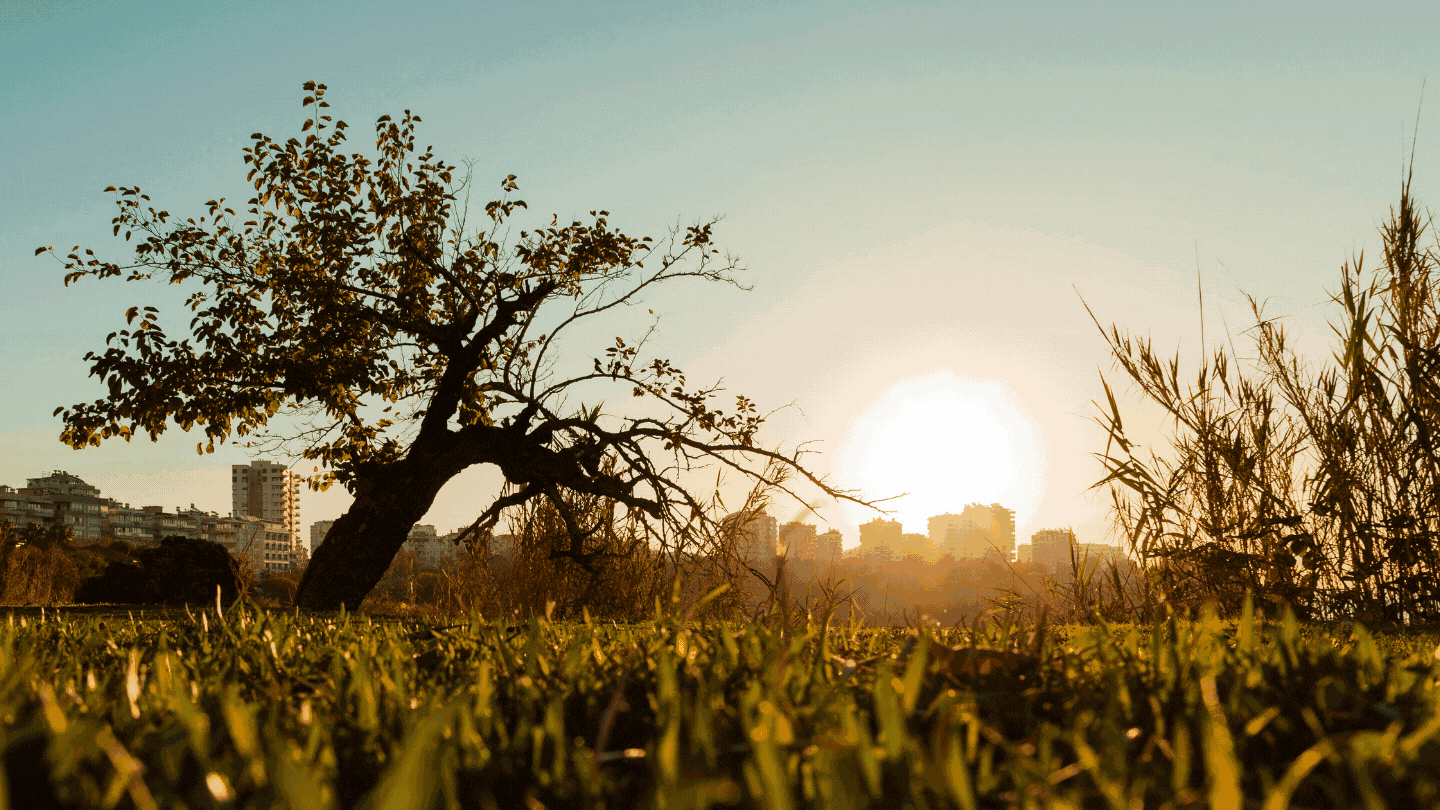
The CitiesWithNature Action Platform is aligned with the 2030 Action Targets in the post-2020 Global Biodiversity Framework, and makes it easy for cities to share their commitments, set their own targets, track their progress, and see how their actions compare with other cities in their country, and globally. It also helps cities gather information on how they contribute to their countries’ National Biodiversity Strategies and Action Plans, and can support national reporting to the UN CBD.
With more than 80% of global Gross Domestic Product (GDP) generated in cities and more than half of global GDP estimated to be dependent on nature, it is clear that cities have a critical role to play in ensuring nature is restored and protected. Local and subnational governments have the power to integrate nature into the way cities work, through policy reform, advocacy and on-the-ground interventions. Topics covered by the Action Platform include everything from nature-based solutions, ecosystem restoration and conservation, to biodiversity mainstreaming, financing and circular economy.
"Cities are on the frontline of the challenges we face as far as #biodiversity is concerned."
— UN Biodiversity (@UNBiodiversity) March 24, 2022
At the Geneva Meetings, @UNBiodiversity's David Ainsworth spoke to @ICLEICBC's Ingrid Coetzee about the #CitiesWithNature Action Platform and more!
➡️https://t.co/rhqE9Rc0Vk#Post2020 pic.twitter.com/tPSxoTvENG
It is fitting that the Action Platform is opening to coincide with Earth Hour, as a catalyst for urgent change to shape our future,
~ Kobie Brand, Global Director of ICLEI’s City Biodiversity Centre Tweet
